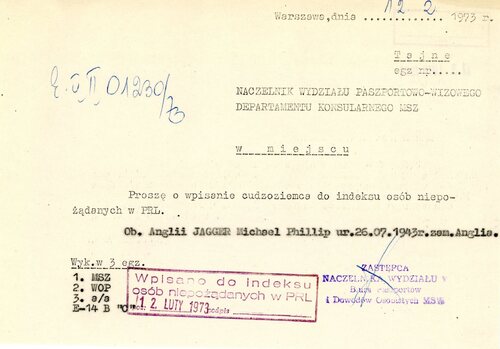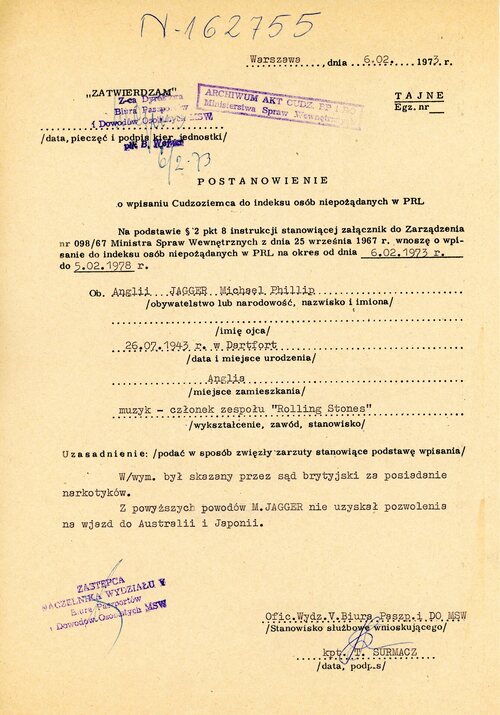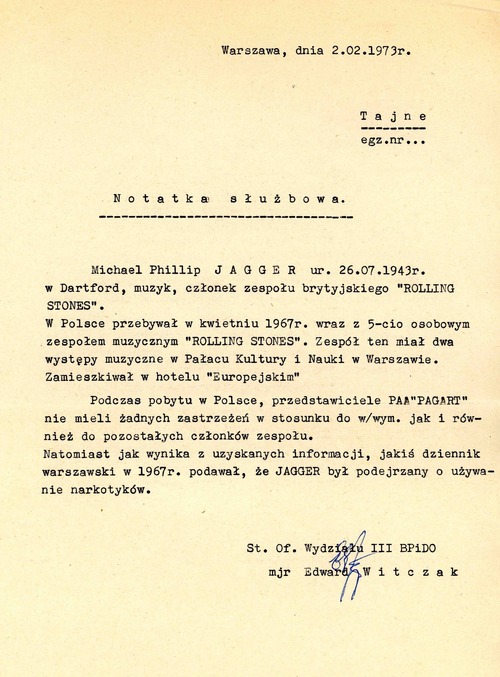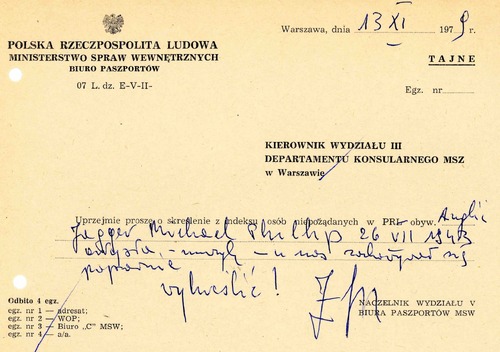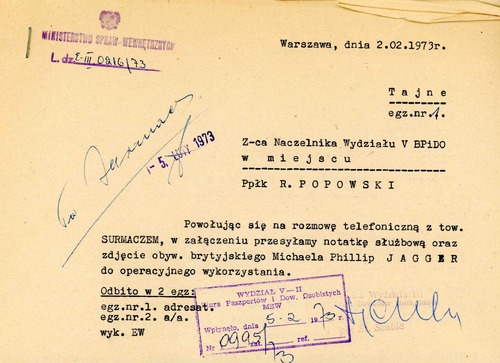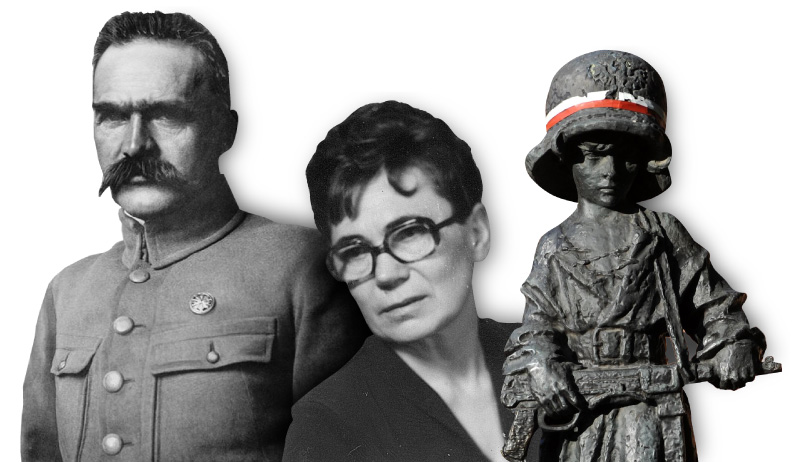Is it possible to find information about Mick Jagger in the archives of the Institute of National Remembrance? The answer to that question seems to be obviously negative, unless the researcher painstakingly going through the files hopes to find any information on the Warsaw concert of the famous band, the Rolling Stones, from April, 1967. Meanwhile, while sources say nothing on this particular event, it turns out that a certain Michael Phillip Jagger, born on 26.07.1943 in Dartford, exists in the archives of the Institute of National Remembrance. Due to an unknown applicant (there is no appropriate document in the files) and the motion of Captain Surmacz from the Fifth Division of the Passports and ID Bureau, the main singer of theRolling Stones ended up on the… "Index of undesirable individuals in the Polish People’s Republic".
A sentence from the Polish Press Agency
It was the year 1973. It has been six years since the concert of the famous band at the Congress Hall and no one planned for the Rolling Stones to perform in Poland ever again. However, the Polish Press Agency published a short note on the fact that Jagger was not let in to Japan and Australia due to being convicted by a British court for drug possession. Clearly, this fact was not left unnoticed by the ever-vigilant communist officers, who decided not to be any worse than their Japanese and Australian counterparts.
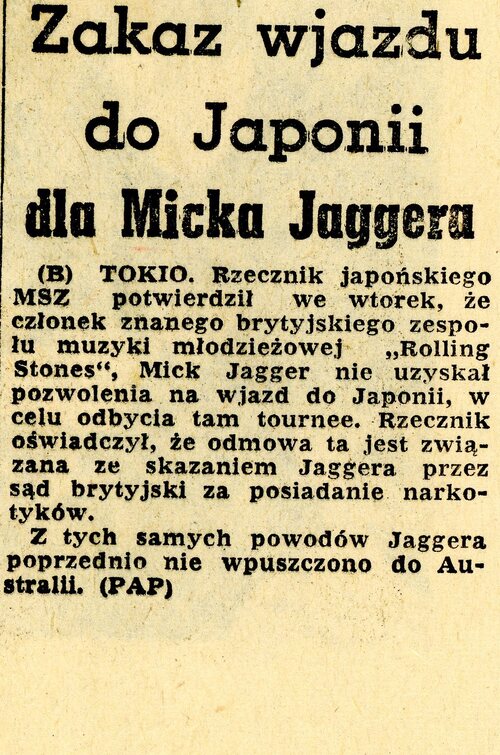
“Mick Jagger banned from entering Japan. Spokesperson for the Japanese Foreign Ministry confirmed on Tuesday that the member of the famous youth music band Rolling Stones, Mick Jagger, was not allowed to enter Japan for the band’s tour. The spokesperson stated that the rejection is connected with Jagger’s conviction by a British court for drug possession. Jagger had previously not been allowed to enter Australia for the same reason. (Polish Press Agency)”. Official press note.
During the times when the most famous musicians from beyond the Iron Curtain came to Poland only once a decade (or even less often), such initiative seemed absolutely grotesque. This decision begs the question (with a rather obvious answer) whether Jagger even knew about such a ban? Nonetheless, he ended up on the index, even though no other band member did, and many of them went through similar problems. Interestingly, Jagger’s drug scandal took place prior to his band’s visit to Poland (in February, 1967), but back then no one thought of banning the Rolling Stones from coming to the Polish capital.
The aforementioned Index of undesirable individuals was a list of foreigners, citizens from non-socialist countries, who were banned from entering the Polish People’s Republic for various reasons. It was kept by the Passports Bureau and the “C” Bureau of the Ministry of the Interior.
The index included people who could “act against the Polish People’s Republic”; who were convicted in the Polish People’s Republic or abroad for committing crimes; who violated the laws of the foreigners’ act and border protection, but also when their stay was undesired due to security reasons or the state’s interests.
Due to an unknown applicant and the motion of Captain Surmacz, the main singer of the Rolling Stones ended up on the… Index of undesirable individuals in the Polish People’s Republic.
The head of the Passports Bureau of the Ministry of the Interior decided whether or not a foreigner should be put on the index of undesirable individuals, however, various officers could file such a motion - from the directors of the Minister’s Cabinet of the Ministry of the Interior and the District Chiefs of Citizens’ Militia to the head of the Internal Military Service and heads of the Internal Military Service’s boards at military precincts, and even the head of Departments etc. The ban was in force for up to five years, although it was often issued indefinitely. It is worth adding, that all foreigners entering the Polish People’s Republic were checked at Border Control Points for being on the index of undesirable individuals by the officers of the Border Protection Troops.
Coming back to Jagger’s case - while Major Witczak from the Third Division of the Passports and ID Bureaudid write:
“During their stay in Poland, representatives of PAA Pagart (the concert’s organiser) had no objections to the aforementioned and other band members”,
However, the information on the conviction for drug possession was the last straw. It is worth adding, that there is no evidence in the files suggesting that anyone tried to verify the quoted information. The short note from the Polish Press Agency was, therefore, most likely the only reason for the decision. The files also suggest that a picture of the musician was also added to the documents. Unfortunately, it was not preserved. Perhaps it was stolen by some collector from the Passports Bureau…
He behaved appropriately here…
Jagger was put on the index on February 6, 1973. The ban was to last (and lasted) for the following five years (one can only imagine what would happen if someone decided to invite the band to Poland). More than a year after its due date, as late as November, 1979, the Head of the Fifth Division of the Passports and ID Bureau of the Ministry of the Interior decided to remove the musician from the index, adding a handwritten note, probably justifying the decision:
“He behaved appropriately here.”
Such sentence, 12 years after the band’s visit to Poland, once again sounds rather grotesque.
Polish fans had to wait a very long time for the Rolling Stones’ next visit to Poland. Mick Jagger sang for the audience of the Silesian Stadium in Chorzów 25 years after he was put on the index of the Polish People’s Republic.

